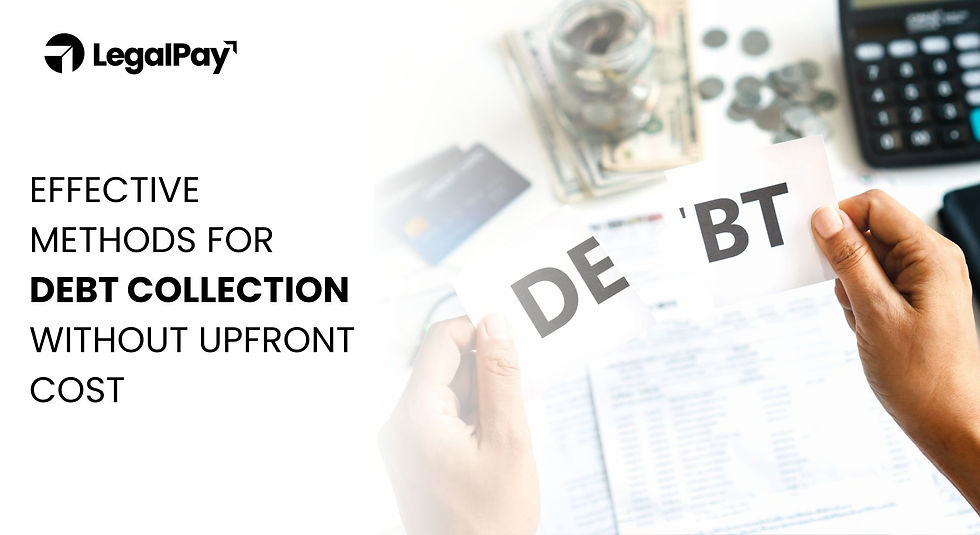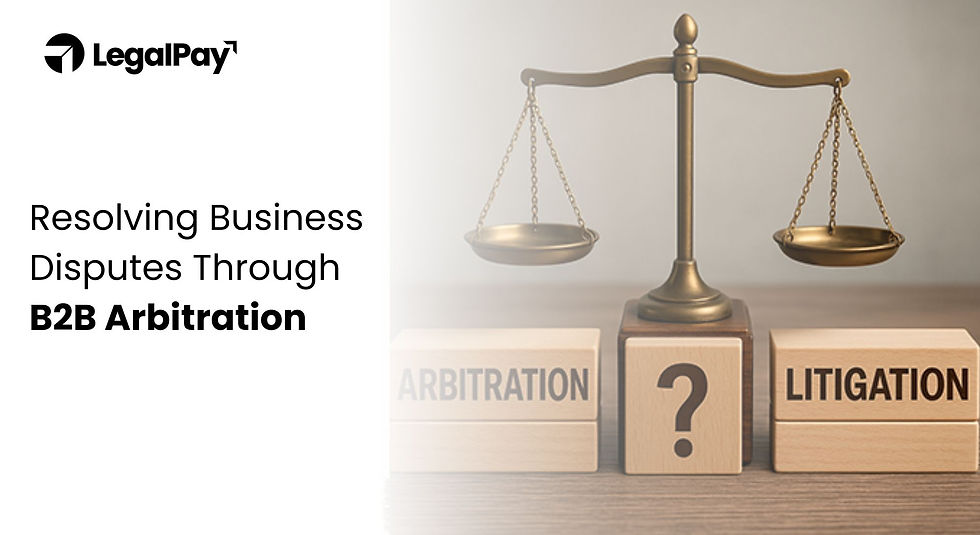Comparing Quick Settle to Traditional Invoice Discounting: Advantages and Differences
- Ganga Sharma

- Feb 7, 2024
- 4 min read

In the dynamic landscape of business settlements, the choice between innovative solutions and traditional methods can significantly impact financial outcomes. LegalPay's Quick Settle has emerged as a transformative force, challenging the conventional approach of traditional invoice discounting. In this blog, we'll explore the advantages and differences between Quick Settle and traditional invoice discounting, shedding light on why businesses should consider adopting this groundbreaking solution.
Introduction
The Changing Face of Business Settlements
As businesses evolve, so do their financial needs. Quick Settle represents a modern approach to settlements, offering businesses a streamlined and efficient alternative to traditional invoice discounting.
Quick Settle vs. Traditional Invoice Discounting
Before delving into the advantages, it's essential to understand the fundamental differences between Quick Settle and traditional invoice discounting. While both serve the purpose of improving cash flow, the methods and benefits diverge significantly.
Understanding the Landscape: Quick Settle and Invoice Discounting
Quick Settle
Offered by LegalPay, Quick Settle acts as a financial shield for businesses facing legal settlements. It instantly covers your settlement amount on day zero, providing immediate relief. Repayment happens through flexible, interest-free EMIs spread over 299 days, preserving your cash flow and working capital. Additionally, Quick Settle offers a comprehensive credit line to handle future settlements.
Invoice Discounting
In this method, a finance provider advances a percentage of your outstanding invoices immediately, usually around 70-85%. You receive the upfront cash, deducting a discounting fee, and repay the total invoice amount later when your customer pays.
Quick Settle vs Traditional Invoice Discounting
Speed and Efficiency
Traditional invoice discounting often involves lengthy processes, causing delays in accessing funds. In contrast, Quick Settle's streamlined approach ensures rapid resolution, allowing businesses to maintain momentum without disruptions.
Flexibility in Repayment
While traditional invoice discounting typically follows fixed repayment structures, Quick Settle offers customizable repayment periods. This flexibility allows businesses to tailor their repayment schedules according to their unique financial situations.
Stress-Free Dispute Resolution
The stress associated with immediate payments is a common challenge with traditional invoice discounting. Quick Settle eliminates this stress by providing businesses with the means to focus on effective dispute resolution without financial constraints.
Key Differences: Tailoring your Choice
While both options provide upfront cash, their underlying mechanisms and suitability differ:
Purpose:
Quick Settle: Specifically designed for legal settlements, offering tailored support and understanding of the legal landscape.
Invoice Discounting: Broad application for businesses with outstanding invoices, not limited to legal settlements.
Funding Source:
Quick Settle: Provides a credit line from LegalPay, acting as a lender.
Invoice Discounting: Involves selling unpaid invoices to a finance provider, converting them into immediate cash.
Repayment:
Quick Settle: Fixed, interest-free EMIs over 299 days.
Invoice Discounting: Varies depending on the provider and invoice terms, potentially involving variable interest rates and repayment timelines tied to invoice due dates.
Eligibility:
Quick Settle: Primarily assesses your financial health and ability to manage EMIs.
Invoice Discounting: Often focuses on the creditworthiness of your customers and invoice quality.
Fees:
Quick Settle: One-time processing fee.
Invoice Discounting: Discounting fee charged as a percentage of the advanced amount, potentially with additional charges for early settlement or late payments.
Why Choose Quick Settle Over Traditional Invoice Discounting?
A. Immediate Financial Relief
Quick Settle's instant relief sets it apart from the gradual nature of traditional invoice discounting. For businesses facing urgent financial obligations, Quick Settle ensures a prompt resolution without the burden of prolonged waiting periods.
B. Budget-Friendly Repayment Options
Interest-free EMIs offered by Quick Settle make it a more attractive option for businesses aiming for budget-friendly payments. Traditional invoice discounting may involve interest costs, impacting the overall financial health of the business.
C. Enhanced Financial Flexibility
The comprehensive credit line provided by Quick Settle gives businesses an edge in terms of financial flexibility. This extended support goes beyond settlement amounts, offering a safety net for various financial challenges.
Choosing the Right Option: Consider Your Needs
Both Quick Settle and invoice discounting offer valuable tools for navigating legal settlements. Your choice depends on your specific needs and situation:
Quick Settle: Ideal for immediate financial relief, budget-friendly EMIs, and preserving cash flow in legal settlements.
Invoice Discounting: Suitable if you need broader applicability beyond legal settlements, faster access to cash, or prefer avoiding debt obligations.
Beyond the Numbers: Value-Added Benefits
While comparing fees and terms is crucial, consider the additional value each option offers:
Quick Settle: The expertise and understanding of LegalPay in the legal domain can provide valuable guidance and support throughout the settlement process.
Invoice Discounting: Some providers offer additional services like credit control and debtor management, streamlining your receivables process.
The Next Step: Making an Informed Decision
Both Quick Settle and invoice discounting offer unique advantages. Carefully consider your needs, compare the terms, and evaluate the added value each option provides. Consulting with a financial advisor experienced in legal matters can further assist you in making the best choice for your business.
Remember, a well-informed decision leads to a smoother settlement process and empowers your business to move forward with financial stability and peace of mind.
Conclusion
In the ever-evolving landscape of business settlements, the choice between Quick Settle and traditional invoice discounting is clear. Quick Settle not only addresses immediate financial needs but also provides a forward-looking approach to dispute resolution and financial flexibility. As businesses navigate the complexities of settlements, embracing innovation becomes a strategic move for sustained growth.
FAQs [Frequently Asked Questions]
Can businesses of all sizes benefit from Quick Settle?
A: Absolutely! QuickS ettle is tailored to cater to the diverse needs of businesses, regardless of their size or industry.
How quickly can Quick Settle resolve legal disputes compared to traditional invoice discounting?
A: Quick Settle is designed to provide instant relief, settling legal disputes on day zero, offering a significant speed advantage over traditional invoice discounting.
Are interest-free EMIs a standard feature of Quick Settle?
A: Yes, Quick Settle offers interest-free EMIs for repayment, ensuring budget-friendly payments for businesses.
What makes Quick Settle's credit line comprehensive?
A: Quick Settle's credit line extends beyond settlement amounts, providing businesses with additional financial support for various challenges.
How does Quick Settle contribute to stress-free dispute resolution?
A: Quick Settle eliminates the stress associated with immediate payments, allowing businesses to focus on effective dispute resolution without financial constraints.




Comments